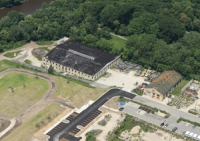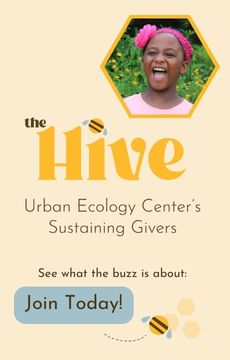This call, which came almost exactly a year ago, catalyzed the most amazing fundraising feat I have ever been a part of. We immediately launched a very quiet, very targeted, very fast, and - almost miraculously - very successful campaign and within just a little over two months we actually had the wherewithal in pledges to compete with these well heeled developers. Long story short, we are pleased as pie and tickled pink to be able to share with our Urban Ecology Center family (meaning you), and the Milwaukee community as a whole (meaning everyone else), yet another milestone in the amazing two decade effort to preserve and protect the urban lands along the restored Milwaukee River corridor.
To get the picture, think of the land in question like a round donut with a big hole cut out of the middle. The yummy ring of cake consists of the Urban Ecology Center headquarters and the Milwaukee Rotary Centennial Arboretum, which includes the following sections: 1) the Oak Leaf Trail on the east, 2) Riverside Park to the north, and 3) the ever improving Milwaukee River wildlife corridor to the south and west. This sanctuary of accessible nature and learning is the chocolate glazed deliciousness that our amazing community (again you!) has created together out of practically nothing for the past 20 years! Now imagine a 4.5 acre hole in the middle of this 40 acre arboretum. From the beginning this “donut hole” has been a materials reclamation and recycling business run by the late Pieter Godfrey. This is not land anyone would give awards to for natural beauty, but the two cream city brick industrial buildings surrounded by numerous piles of stone, coupled with the smell of fresh cut lumber from the converted saw mill had its own gritty charm -- not totally incongruous to the Center’s mission for urban sustainability, I might add. This “donut hole” was for sale.
Now imagine two universes:
In one universe, this donut hole is converted into 200 units or more of stacked housing with associated parking similar to the condominiums, apartments and dorms that sprouted up when we successfully cleaned up this urban stretch of river some 15 years ago. Think 24-hour lights and traffic and the sounds of congestion near the owls, herons, turtles and migrating birds and bats we so diligently study. Think of the tens of thousands of school children and visitors who now flock to this land as well, each having to avoid the daily traffic that housing of this type brings.
In the other universe, this land is controlled by the Urban Ecology Center, a nonprofit that emerged organically from this very same neighborhood community and is still run by its community-based board of directors representing many thousands of neighborhood members and friends. Think more park land, more nature, expanded learning, perhaps an ecological campus or an ecologically minded business, living community or school. The perfect exclamation mark to the spectacular Milwaukee Rotary Centennial Arboretum which we introduced to Milwaukee in September.
Well guess what? Thanks to the incredible and quiet support from 28 of our very best of friends (drum roll please!) universe two is our new reality! As of December of 2013, the 4.5 acres, two industrial buildings and all the contents within and on the land belong to the Urban Ecology Center! Can you believe it? We spent all summer and fall kicking the tires, checking the lights and slamming the doors (so to speak) to make sure we were not doing something stupid by purchasing an albatross of environmental issues, or a sink hole of crazy work, and in November, with the data in, our board made the unanimous vote to move forward.
Now, before people get too excited, or enraged as the case may be, let me quickly clarify two important points:
1) It should go on record that the Urban Ecology Center is not anti-development. We actually support well designed stacked housing in an urban environment like ours. More people living efficiently in the city means less nature-killing urban sprawl, less need for fossil fuels to get people out to distant homes and less infrastructure needed to reach distant places with water, sewage and waste removal. At the same time, however, where these buildings are placed matters. It is our opinion that keeping a buffer of land and natural views near to the Milwaukee River is important. This is why we were a lead partner in the creation of the Milwaukee River Greenway Coalition and the zoned overlay district that protects it.
2) We purchased this land, with the help of our friends, so that we can have full control of what happens next. What that vision is, however, is yet to fully emerge and is sure to take quite a lot of time -- and, yes, it will require more resources than we currently have available to us. It may take a few years before we can even get started as our hands are still a little full with some other pretty incredible projects. It also should be stated clearly from the outset that we do not know for sure that we will be able to save both of Pieter Godfrey’s buildings, in fact preliminary studies make it seem improbable that more than one can be saved.
We saw this purchase as a once in a lifetime opportunity, something that it was imperative to seize now as a generational opportunity for the future. We do have a crazy amount of work ahead, but it is work to be celebrated with excitement and anticipation. Wow!





